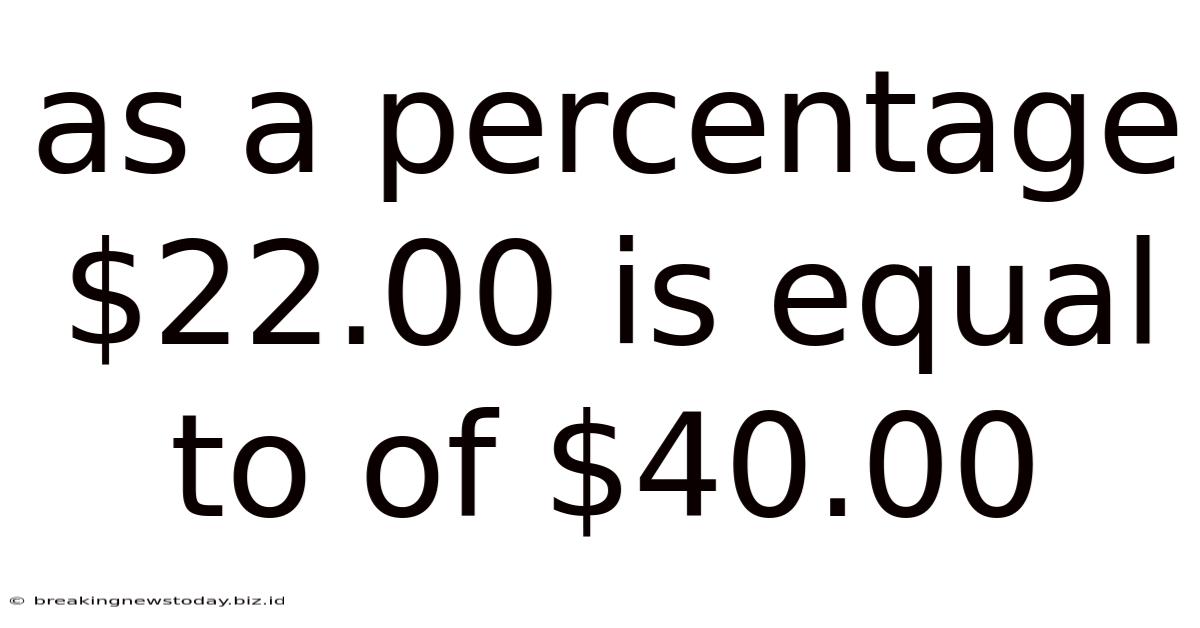As A Percentage $22.00 Is Equal To Of $40.00
Breaking News Today
Jun 07, 2025 · 4 min read

Table of Contents
As a Percentage, $22.00 is Equal to What Percentage of $40.00? A Comprehensive Guide to Percentage Calculations
Understanding percentages is a fundamental skill applicable across various aspects of life, from calculating discounts and taxes to analyzing financial data and understanding statistics. This comprehensive guide delves into the calculation of what percentage $22.00 represents of $40.00, providing a step-by-step approach and exploring related concepts to solidify your understanding of percentage calculations.
Understanding Percentages
A percentage is a fraction or ratio expressed as a number out of 100. It represents a portion of a whole. The symbol "%" denotes percentage. For instance, 50% means 50 out of 100, or one-half. Understanding percentages is crucial for various real-world applications:
- Financial Calculations: Calculating interest rates, discounts, taxes, profit margins, and tips.
- Data Analysis: Interpreting statistical data, analyzing survey results, and understanding trends.
- Everyday Life: Understanding sales, comparing prices, and comprehending proportions.
Calculating the Percentage: A Step-by-Step Guide
To determine what percentage $22.00 represents of $40.00, we'll follow a straightforward method:
Step 1: Set up the Equation
The basic formula for calculating a percentage is:
(Part / Whole) * 100% = Percentage
In our case:
- Part: $22.00 (the amount we want to express as a percentage)
- Whole: $40.00 (the total amount)
Step 2: Substitute the Values
Substitute the values into the formula:
($22.00 / $40.00) * 100% = Percentage
Step 3: Perform the Calculation
First, divide the part by the whole:
$22.00 / $40.00 = 0.55
Next, multiply the result by 100%:
0.55 * 100% = 55%
Step 4: State the Result
Therefore, $22.00 is equal to 55% of $40.00.
Practical Applications and Real-World Examples
Understanding percentage calculations allows you to tackle various practical scenarios effectively:
1. Sales and Discounts
Imagine a shirt originally priced at $40.00 is on sale for $22.00. Using the percentage calculation, we've determined the discount is 55%. This allows for easy comparison with other discounts and helps make informed purchasing decisions.
2. Financial Analysis
Businesses use percentage calculations extensively to track profitability. If a company's total revenue is $40.00 and its profit is $22.00, the profit margin is 55%. This metric helps assess the company's financial health and efficiency.
3. Tax Calculations
If a product costs $40.00, and the sales tax is $22.00, we can quickly determine that the sales tax rate is 55%. This knowledge allows individuals to budget effectively and understand the final cost of purchases.
4. Data Interpretation
In statistical analysis, percentages are commonly used to represent proportions. For example, if a survey of 40 respondents shows 22 prefer a specific product, the percentage of respondents favoring the product is 55%. This aids in understanding customer preferences and market trends.
Beyond the Basics: Advanced Percentage Calculations
While the above example demonstrates a straightforward calculation, percentage problems can become more complex. Let's explore some variations:
1. Finding the Whole when the Percentage and Part are Known
If you know that 55% of a number is $22.00, how would you find the whole number? The formula is rearranged:
Whole = (Part / Percentage) * 100
In this case:
Whole = ($22.00 / 55%) * 100 = $40.00
2. Finding the Percentage Increase or Decrease
Imagine the price of an item increases from $22.00 to $40.00. To calculate the percentage increase:
- Find the difference: $40.00 - $22.00 = $18.00
- Divide the difference by the original amount: $18.00 / $22.00 = 0.818
- Multiply by 100%: 0.818 * 100% ≈ 81.8%
Therefore, the price increased by approximately 81.8%. Percentage decrease calculations follow a similar method.
3. Calculating Percentage Points
Percentage points refer to the arithmetic difference between two percentages, not the percentage change. For example, if the interest rate increases from 10% to 15%, it is a 5 percentage point increase, not a 50% increase.
Tips for Accurate Percentage Calculations
- Double-check your work: Errors in simple arithmetic can lead to inaccurate results.
- Use a calculator: For more complex calculations, using a calculator ensures accuracy.
- Understand the context: Always ensure you're applying the correct formula to the specific problem.
- Practice regularly: The more you practice percentage calculations, the more comfortable and accurate you'll become.
Conclusion: Mastering Percentage Calculations for Success
Understanding and accurately calculating percentages is a vital skill applicable in numerous situations. From managing personal finances to analyzing data and making informed business decisions, mastering this fundamental concept empowers you to navigate various aspects of life with greater confidence and efficiency. By applying the methods and understanding the variations explained in this guide, you can confidently tackle diverse percentage-related problems and harness the power of percentage calculations for your personal and professional growth. Remember to practice regularly, and don't hesitate to review the steps outlined here when tackling new challenges. The ability to swiftly and accurately calculate percentages will undoubtedly serve you well.
Latest Posts
Latest Posts
-
David Y Juan Molestar Levantarse Temprano
Jun 07, 2025
-
Rank The Following Electron Pair Geometries By Increasing Steric Number
Jun 07, 2025
-
All Of These Are Types Of Punches Except
Jun 07, 2025
-
Complete The Leve Please Level 91
Jun 07, 2025
-
The Entrance Portal Of The Romanesque Cathedral Symbolized
Jun 07, 2025
Related Post
Thank you for visiting our website which covers about As A Percentage $22.00 Is Equal To Of $40.00 . We hope the information provided has been useful to you. Feel free to contact us if you have any questions or need further assistance. See you next time and don't miss to bookmark.